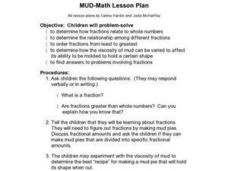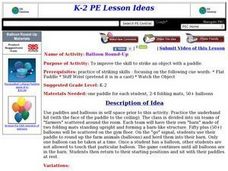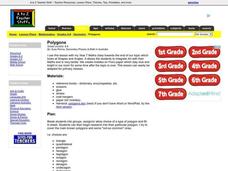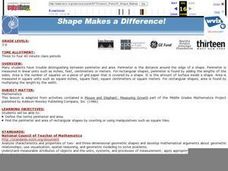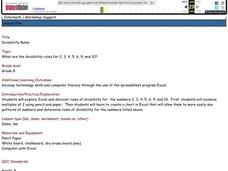Curated OER
Line Of Best Fit: Feet & Forearms
Learners actively find the line of best fit. They gather their own data and then use a calculator to find the line of best fit, as well as the equation. They see how to use the TI 81 calculator in order to find the line of best fit.
Curated OER
Mud Pies
Students determine how fractions relate to whole numbers. They determine the relationship among different fractions and order fractions from least to greatest. They
determine how the viscosity of mud can be varied to affect its...
Curated OER
Balloon Round-Up
Students practice using paddles to hit objects. In this striking skills lesson, students use wooden paddles to round up balloon farm animals without touching the balloons with their hands.
Curated OER
Polygons
Learners work together to create mobiles with different polygons. They research the polygon and list its characteristics. They may present to the class if they chose to.
Curated OER
Cornbread Addition
Fourth graders, after being given a box of cornbread mix, follow the directions to make the cornbread. They utilize measuring cups to mix all the ingredients together and incorporate adding simple fractions while mixing up the cornbread.
Curated OER
Problem Solving in Mathematics
Seventh graders discover that there are multiple strategies to be used in problem solving. They explain a problem solving situation in their own words and determine a possible strategy for solving the problem.
Curated OER
Digit Reversal Correction: 6 Doesn't Mix
Students practice methods of remembering by association. In small groups, children explore directions of numbers. Students practice procedures for digit reversal correction.
Curated OER
Interior of the Earth
Sixth graders identify and describe the composition and physical properties of the layers of the Earth. They also explain how scientists used the scientific process to know about the center of the Earth. Finally, 6th graders read a...
Curated OER
Home on the Biome
Fifth graders study six major biomes, graph temperature and rainfall, and present their findings to the class.
Curated OER
Time, Tide, and Quahogs
Students read tide tables for Waquoit Bay as the simulate determining the best time to go clam digging for a Wampanoag clambake. They graph the tide tables while realizing that the tides a Waquoit Bay are one hour later than those at...
Curated OER
Vampires: Fact or Fiction?
Middle schoolers predict how many vampires are in the world, based on the legend that, once bitten, each victim becomes a vampire. Extrapolating how many vampires would populate the earth in 30+ weeks, students then compare the total...
Curated OER
Measurement
First graders participate in various activities dealing with measurement, length, volume, and temperature. They identify the need for standard units of measure, sort and classify objects, measure distances, and use a thermometer.
Curated OER
Jo's Table
Students continue a sequential pattern using a partially filled in table and simple addition exercise. They use problem solving strategies such as guess and check, make a table, look for patterns. They discuss their finding with the class.
Curated OER
Bar Me In
Fourth graders watch a video about constructing bar graphs. They create their own graph and interpret it.
Curated OER
Fly Away With Averages
Learners study mean, median, and mode. They construct paper airplanes and test them to see how far they fly. They measure the distance and then find the averages of their throws. They use spreadsheet software to record the data in a...
Curated OER
Bald Eagle Population Graphing
Young scholars create graphs to illustrate the bald eagle population. They identify the population of bald eagles in Minnesota and the United States. They create three graphs to represent the population data including a line, bar, and...
Curated OER
Mini-Economy
Third graders perform jobs in order to sustain their classroom community. After completing a brief overview of how local economies are sustained, they complete job applications for classroom jobs. Students perform their jobs throughout...
Curated OER
Bead It!
Fourth graders use colored beads in two problems and explore the use of proportional reasoning as a problem solving method. Working Students, in groups, explain their reasoning strategies orally, and through drawings.
Curated OER
Shape Makes a Difference!
Learners learn the difference between perimeter and area by watching a video and a hands on activity.
Curated OER
Geography: Snow Cover on the Continents
Young scholars create maps of snow cover for each continent by conducting Internet research. After estimating the percentage of continental snow cover, they present their findings in letters, brochures or Powerpoint presentations.
Curated OER
Divisibility Rules
Eighth graders explore Excel and discover rules of divisibility for the numbers 2, 3, 4, 5, 6, 9, and 10; students examine multiples of 2 using pencil/ paper, then create a chart in Excel that will allow them to more easily see patterns...
Curated OER
Block Breakers
Students throw bean bags at stacks of blocks. They record the results and write the corresponding mathematical equations.
Curated OER
Calculator Pattern Puzzles
Students explore number patterns and relationships while being introduced to the calculator at the same time.
Curated OER
Pika Chew
Students work in collaborative teams with specific roles, use the Internet to research the behavior and ecology of pikas, make predictions about survival rates of pikas in different habitats and organize their data in graphs.



